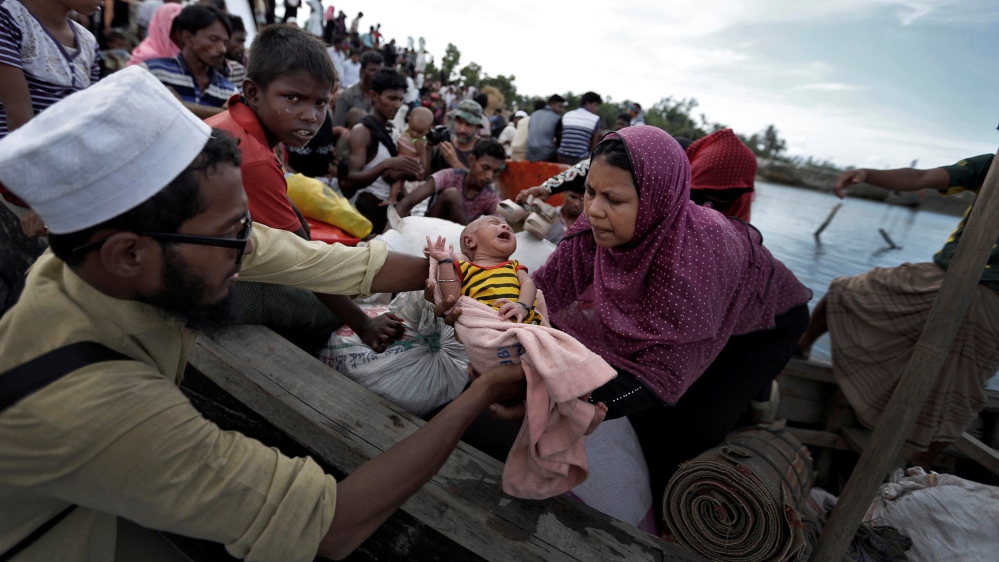Rohingya politicians excluded from Myanmar’s upcoming election
Authorities disqualify at least six Rohingya politicians from contesting the elections for lack of ID documents.

Aspiring politician Abdul Rasheed was born in Myanmar and is one of very few majority-Muslim Rohingya to have Myanmar citizenship.
His father was a civil servant. But when the country goes to the polls in November, the businessman will not be able to stand as a candidate because officials accuse him of having foreign roots.
Keep reading
list of 4 itemsConflict, climate, corruption drive Southeast Asia people trafficking: UN
Bodies of three Rohingya found as Indonesia ends rescue for capsized boat
How is renewed violence in Myanmar affecting the Rohingya?
Rasheed is among at least a dozen Rohingya with Myanmar citizenship who have applied to be candidates in the November 8 general election, hoping to get into politics under the new democratic government led by Nobel laureate Aung San Suu Kyi.
Six of them had been rejected after officials said they failed to prove their parents were citizens at the time of their birth, a requirement under the election law.
Everyone in Myanmar, regardless of their ethnicity or religion, must have the same opportunity to contest in elections.
The election is another important test for Myanmar as it makes a transition away from military rule but rights groups say the disqualification of Rohingya candidates demonstrates the limits of reform.
“Everyone in Myanmar, regardless of their ethnicity or religion, must have the same opportunity to contest in elections,” said Tun Khin, head of the Burma Rohingya Organisation UK, urging international donors to halt funding to the electoral agency.
In his apartment in Yangon, Rasheed leafed through reams of identity cards and letters.
“We have all these documents that the government issued, and they don’t accept the fact that my parents are citizens. I feel bad about that and concerned,” he told the Reuters news agency.
Undocumented immigrants
Myanmar does not recognise the term Rohingya or the community as an Indigenous ethnic group.
Instead, they are derided as “Bengalis”, implying they are undocumented immigrants from Bangladesh, despite tracing their history in Myanmar’s Rakhine state back centuries.
Successive military governments that ruled Myanmar stripped the Rohingya of identity documents, leaving many with no proof of their origins.
More than 730,000 fled from Myanmar in 2017 after a military crackdown the United Nations said was carried out with genocidal intent. In January, the International Court of Justice ordered Myanmar to protect the Rohingya from genocide.

Myanmar denies genocide, saying its security forces were engaged in a legitimate campaign against a Rohingya armed group.
Several hundred thousand Rohingya who remain in Myanmar are mostly confined to camps and villages and subjected to curbs on movement and access to healthcare.
Monywa Aung Shin, a senior official from Aung San Suu Kyi’s governing National League for Democracy, said the electoral organisations that rejected the candidates were just following the law.
“Whether Bengali or not, foreigners and non-ethnic people are not allowed to run in the election,” he told Reuters.
‘No voter list’
Tin Hlaing, chairwoman of the Rakhine state election commission that rejected Rasheed’s application, said it was “certain” his parents were not citizens at the time he was born.
In his apartment, Rasheed held up the documents held by both his parents, which he said once sufficed as proof of citizenship. The cards were withdrawn in the 1990s when many Rohingya found such cards replaced with temporary “white cards”.
In 2015, President then-Thein Sein announced the white cards would also be nullified, stripping Rohingya of the right to vote in the 2015 polls that brought Aung San Suu Kyi to power.
While excluded from voting or standing in that election, many Rohingya put their faith in the longtime democracy leader’s party.
“We can understand the previous situation, that previous governments backed up by the military did not follow the democratic norms,” said Kyaw Soe Aung, the general secretary from Democracy and Human Rights party (DHRP), one of three Rohingya parties in Myanmar.
We have all these documents that the government issued, and they don't accept the fact that my parents are citizens.
“But it is difficult to understand that Aung San Suu Kyi and her democratic government would do the same.”
The party chairman, Kyaw Min, 72, was also rejected this week, despite winning a seat in a 1990 election, that was nullified by the former military government, and spending years in prison along with other democracy activists.
Abu Tahay, an independent Rohingya candidate who was also barred from the polls, said the exclusion of Rohingya people from the election – as candidates and voters – meant they would feel thwarted in trying to reach their goals of securing citizenship and living in “peaceful coexistence” with all citizens.
“They don’t have any hope for their future,” he said.
While voter lists have been posted across the country, none has appeared at the camps outside the Rakhine state capital of Sittwe, where about 100,000 Rohingya are confined, community elder Kyaw Hla Aung told Reuters by telephone.
“In 2015, about 200 people appeared on the voter list but this time, there is no voter list.”
Aye Win, one of the six Rohingya who have been approved to stand in the election, said there was little hope of victory unless many more Rohingya were granted citizenship ahead of the vote.
“If not, the situation is not good,” he said.